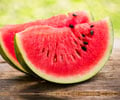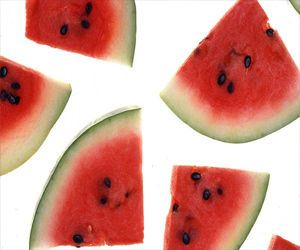Watermelon may be even more nutritious than previously thought, and it may also help lessen your risk of heart disease.
- Eating watermelon may be healthier than previously thought
- Researchers discovered that study participants who had more watermelon consumed more vital nutrients such as fiber, potassium, and vitamin C
- Watermelon can also help you stay hydrated and reduce your risk of heart disease
Watermelon Intake Is Associated with Increased Nutrient Intake and Higher Diet Quality in Adults and Children, NHANES 2003-2018
Go to source).
The authors of the study examined data from the National Health and Nutrition Examination Survey (NHANES) cycles 2003 to 2018. They discovered that persons who ate watermelon ingested more vital nutrients such as dietary fiber, magnesium, potassium, vitamin C, and vitamin A, as well as lycopene and other carotenoids. According to the study's authors, this implies that watermelon can improve nutrient intake as well as food quality in both children and adults in the United States. These findings are similar to earlier studies that have demonstrated that consuming fruit, in general, contributes to nutrient intake, although other studies have not looked particularly at watermelon. Watermelon consumers had reduced intakes of added sugars and total saturated fatty acids, according to the data analysis. Kristen Fulgoni, research analyst and study author, will present the findings of the study at the American Society for Nutrition annual meeting, Nutrition 2023, which will be held in Boston from July 22-25.
Health Benefits and Nutritional Profile of Watermelon
Watermelon is high in water, low in fat, and high in important vitamins and minerals. Watermelon consumption has been linked to the following health benefits:- Reduce your blood pressure
- Insulin resistance has been reduced
- Muscle pain is reduced (recovery is faster)
- Improved digestion, skin health
- Lower levels of inflammation
Watermelon, raw
Go to source):
- 30 calories
- Water: 91%
- Protein content: 0.6 g
- Carbohydrates: 7.6 g
- 6.2 grams of sugar
- 0.4-gram fiber
- 0.2 gram of fat
Heart-Healthy Benefits of Watermelon
"Watermelon is a fruit that is rich in vitamins C, magnesium, calcium, and potassium, as well as a great way to stay hydrated," explains Kristin Kirkpatrick, MS, RDN, a nutritionist and author of "Skinny Liver." "It also has a low glycemic load, which counteracts the notion that eating watermelon will cause extreme spikes in blood sugar and insulin," Kirkpatrick says. She specifically relates watermelon's heart-health advantages to lycopene, a plant-based antioxidant.Lycopene is the ingredient that gives certain fruits their pink or red color. According to research, lycopene may reduce your chance of developing heart disease or dying from heart disease (3✔ ✔Trusted Source
Carotenoids and cardiovascular health
Go to source). According to the USDA, a cup and a half of watermelon contains 9 to 13 milligrams of lycopene. According to Kirkpatrick, who cites the study, watermelon contains 40% more lycopene than tomatoes.
"It's also high in an amino acid known as citrulline," Kirkpatrick says. Citrulline has gained popularity as a workout supplement due to its ability to widen blood vessels and maybe increase muscle building. Julie Cunningham, a certified dietitian and diabetic educator, also mentions citrulline or L-citrulline, which occurs naturally. "Watermelon is an especially good source of L-citrulline," she notes, "a substance that researchers have discovered lowers blood pressure and helps prevent artery clogging."
Delicious and Creative Ways to Enjoy Watermelon: From Sweet Substitutes to Refreshing Salads and Salsas
Kirkpatrick offered the following suggestions for incorporating more watermelon into your diet. Watermelon can be used as a substitute for high-sugar sweets. "For example, having a cup of watermelon instead of ice cream will provide more nutrient density," Kirkpatrick explains.During activities, bring watermelon as a snack. "Snacking on watermelon during a hike will help with hydration," she explains. Make slushies out of frozen watermelon. Salads can benefit from the addition of watermelon. "Grilled watermelon slices go well on arugula salads," says Kirkpatrick. Cunningham also likes using watermelon in salads. "Cold watermelon salad makes a great summer side dish," she explains. "Just mix cubed watermelon, chopped cucumbers, crumbled feta cheese, and fresh basil and mint leaves," she explains.
Then, while it is not required, it is recommended to refrigerate for several hours ahead of time. "If you want to go a little more fancy, dress with honey and lime juice," Cunningham recommends. "When combined with mango, red onion, jalapeno, lime, and cilantro, watermelon makes an excellent salsa," Cunningham suggests serving with chips or over chicken or fish at dinner.
References:
- Watermelon Intake Is Associated with Increased Nutrient Intake and Higher Diet Quality in Adults and Children, NHANES 2003-2018 - (https://pubmed.ncbi.nlm.nih.gov/36432573/)
- Watermelon, raw - (https://fdc.nal.usda.gov/fdc-app.html#/food-details/167765/nutrients)
- Carotenoids and cardiovascular health - (https://pubmed.ncbi.nlm.nih.gov/16762935/)
















